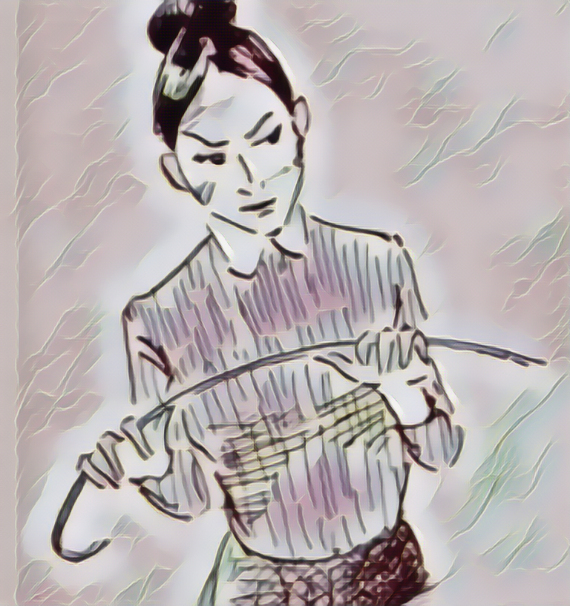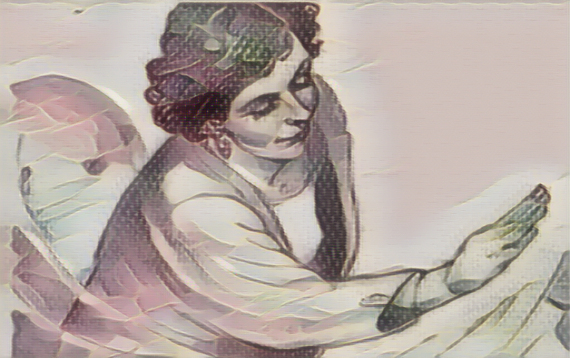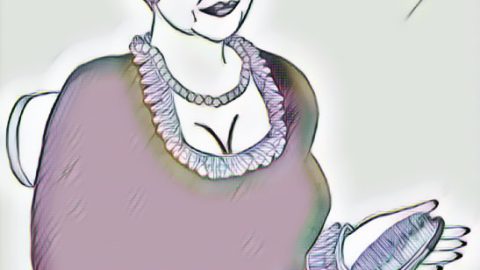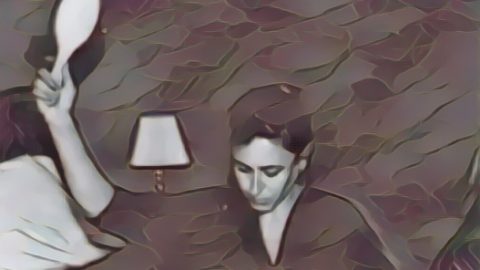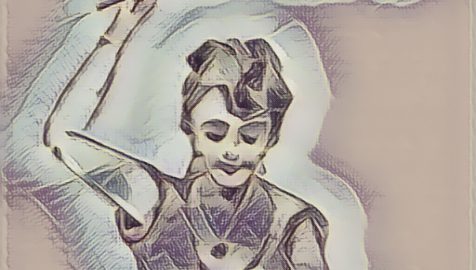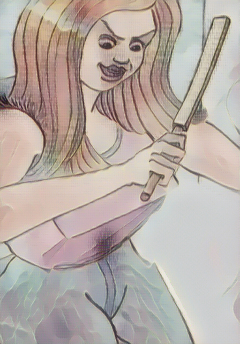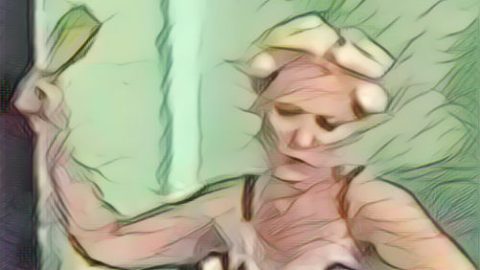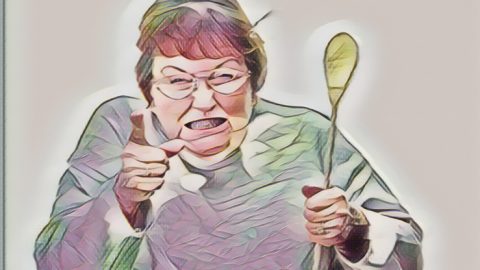(gap: 2s) The first time I received the cane was at my Aunt Evelyn’s house, in the late 1960s. Aunt Evelyn was the very picture of a character from a classic adventure story—tall and brisk, with a beehive hairstyle that never lost its shape, and a collection of crisp, floral aprons that always appeared freshly pressed. She moved about the house with purpose, her sensible shoes tapping on the linoleum, and her sharp blue eyes missing nothing. There was always a faint scent of Yardley lavender about her, mingling with the ever-present aroma of home-baked scones and the distant hum of a transistor radio playing Beatles melodies. Her laughter was quick and bright, but her voice could command attention like a sergeant-major’s when necessary. She was both the heart and the law of her rambling house at the edge of a thick wood, where I spent my summer days playing with her son Allen and her daughter Elizabeth, who was my own age.
On this particular occasion, it was a perfect summer’s day in 1968, and we had enjoyed a splendid time swimming in a small pond in the middle of a sun-dappled glade. We splashed about, pretending we were in an adventure, and the world felt boundless and free. However, our perfect day was marred when we realised, with a start, that we were nearly an hour overdue back at the house.
We hurried back as quickly as our legs would carry us, bare feet striking the warm earth, but Aunt Evelyn was waiting for us in the kitchen, her beehive immaculate and her apron crisp. We stood there in our damp bathing costumes, attempting to stammer out excuses, but from the worried look on my cousins’ faces, I knew we were in trouble. Aunt Evelyn pointed sternly to the study, and Allen and Elizabeth made their way there, with me following behind.
The air in the study was thick with tension, the late afternoon sun slanting through the lace curtains and casting long, trembling shadows on the faded rug. Allen whispered that we were certain to receive the cane, and Elizabeth began to weep quietly, her hands twisting the hem of her swimsuit. We stood there, shivering in our wet costumes, until Aunt Evelyn entered, holding a formidable-looking cane that seemed as if it belonged in a 1950s schoolroom. It was a long, slender rod of polished rattan, about three feet in length, with a slight natural curve and a glossy, honey-coloured finish. The handle was wrapped tightly in faded black electrical tape, giving her a firm grip, and the tip was darkened and slightly frayed from years of use. My mother disciplined me at home, but she used a hairbrush or slipper—never the cane. From the look on the others’ faces, I knew this would be quite different.
Aunt Evelyn’s method was precise, almost ritualistic. She told Allen to fetch a chair—one of those sturdy wooden ones with a vinyl seat, the kind found in every kitchen in 1969—and ordered us girls to stand to the side. Allen moved the chair to the centre of the room, his face pale, and bent over the back, placing his hands on the seat. The room was silent except for the ticking of the wall clock and the faint, distant sound of a lawnmower outside.
As soon as Allen was in position, Aunt Evelyn asked, “Have you forgotten something?” Allen’s face went from pale to scarlet as he pleaded, “Mother, please—not in front of them!” Aunt Evelyn was unmoved. “The current count is six, but I can soon double that, young man!” Her tone was icy, her authority absolute. The cane tapped rhythmically against her palm as she waited for Allen to comply.
At those words, Allen braced himself. It was a dreadful embarrassment for him, and a shock for me, who had only read about such things in old-fashioned storybooks. The anticipation was almost worse than the punishment itself; the air seemed to vibrate with dread.
Aunt Evelyn gave us all a stern lecture about the importance of being home on time, her voice as crisp as the pleats in her skirt. Allen was stiff with dread, and I caught my first glimpse of a boy in such a predicament, his face turning beetroot red. The cane hovered in the air, a symbol of both justice and fear.
Aunt Evelyn tapped his bottom with the cane several times, making Allen squirm, before she raised the rod and, with a swoosh, brought it down firmly across the middle. The sound was sharp, echoing off the walls. Allen’s bottom rippled under the stroke and a loud groan escaped him, followed by tears as he shifted from foot to foot. The mark appeared instantly, a vivid red line against his pale skin.
The second and third strokes left Allen hopping in place, angry red welts rising on his skin. He clenched and unclenched his fists, sobbing as the pain took hold. Aunt Evelyn paused between each stroke, allowing the sting to settle in, her face set in a mask of stern resolve. The atmosphere was thick with the mingled scents of lavender and apprehension.
The fourth stroke landed lower, and Allen let out a yelp, his legs trembling. Elizabeth was crying now too, her sobs muffled by her hands. I was frightened, but also strangely fascinated by the whole process, as if I had stepped into a scene from a boarding school story. The discipline was both public and deeply personal, a lesson etched in pain and humiliation.
The fifth and sixth strokes came in quick succession, landing on Allen’s lower bottom and upper thighs, making him cry out. He finally stood, face scrunched in distress, tears streaming down. Aunt Evelyn’s expression softened for a moment, but she quickly regained her composure, motioning for him to stand against the wall, hands at his sides, eyes downcast.
Aunt Evelyn now pointed to Elizabeth, who moved toward the chair, her knees knocking together. With tears running down her cheeks, she asked plaintively, “Must I?” Her mother simply replied, “Now!” My own fear began to rise, a cold knot in my stomach.
Elizabeth bent over the chair just as Allen had, and waited for the first stroke. She let out a scream as the cane landed, her legs shivering in agony. The next two strokes landed lower, each one leaving a horrid, swollen red mark that bruised and made her cry out. Her pleading was ignored as the caning continued, Aunt Evelyn’s face set in grim determination.
By the fourth stroke, Elizabeth was sobbing so hard she could barely breathe, her hands gripping the seat for dear life. The fifth and sixth strokes were delivered with the same measured force, each one a lesson in obedience and consequence. By the sixth stroke, Elizabeth was weeping uncontrollably, and her mother had to help her to stand against the wall, six angry welts crossing her back.
Now Aunt Evelyn pointed at me. My heart hammered in my chest as she led me to the chair and guided me into position. I was shivering in fear as she tapped my bottom with the cane and told me to brace myself. The room seemed to shrink around me, the ticking clock impossibly loud.
I heard a whoosh through the air and then felt a sting in my bottom that quickly grew into the most dreadful pain I had ever known. I jumped up, crying out, grabbing my bottom with both hands as I twisted in pain, tears rolling down my cheeks. The pain was sharp, electric, and all-consuming.
Aunt Evelyn took me gently but firmly by the arm and put me back into position. “Hold on to the seat of the chair and let us try that stroke again.” Her voice was firm, but not unkind—there was a sense of duty in her actions, as if she believed this was the only way to teach us right from wrong.
Again, I heard the cane whistle through the air and felt my bottom burn with pain. I struggled to stay in position as my legs trembled and tears began to fill my face. Each stroke felt like a red-hot iron pressed against my skin, and I cried out and fought to stay in place. Aunt Evelyn paused between each stroke, letting the lesson sink in, her eyes never leaving my face.
The fourth, fifth, and sixth strokes came with relentless precision, each one building on the last, the pain radiating through my body. Finally, the last and seventh stroke landed on my upper thighs and I nearly collapsed. My aunt took me by the arm and led me to stand against the wall. Any concerns of modesty, standing there in my bathing costume next to her son and daughter, were overpowered by the sheer agony of my throbbing bottom.
The aftermath was a blur of pain and shame. After about ten minutes, Aunt Evelyn told us to go to our rooms. The fire in my bottom had overpowered my senses, and each step hurt as I slowly walked away, the sound of the Rolling Stones drifting faintly from a radio somewhere in the house. The house felt different now—quieter, more solemn, as if the very walls had absorbed our lesson.
When we reached our room, Elizabeth and I lay face down on our beds and wept for a good long time. The pain throbbed with every heartbeat, a constant reminder of Aunt Evelyn’s discipline. Aunt Evelyn came in a little later and ordered us to go to bed, her voice softer now, almost gentle, as if the storm had passed and she was once again the loving aunt we knew.
My bottom was sore for the entire next day, and sitting was a very uncomfortable event, whether on the hard wooden chairs at breakfast or the scratchy orange corduroy sofa in the lounge. That was my first caning, and I was determined it would be my last. The memory of Aunt Evelyn’s methodical discipline, the atmosphere thick with tension and the mingled scents of lavender and apprehension, would stay with me for years—a vivid, indelible lesson from a summer long ago.
